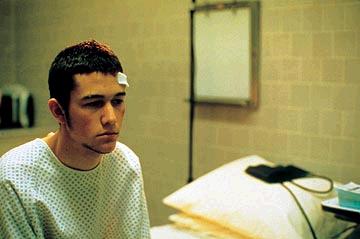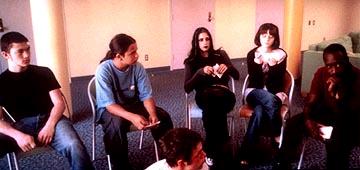

Manic is one of those films that actors flock to because it allows them to express a wide range of emotions otherwise not available in other roles. The characters in Manic are in a mental institution, so fits of rage and agony are the norm. Joseph Gordon-Levitt (Forever Lulu, 10 Things I Hate About You) effectively shatters the image he cultivated on Third Rock From the Sun. It's a good move on his part, since now people know that he is capable of a wider range than lame sitcom that died past its prime. The issue here is that Manic has no real substance to it, and feels more like a workshop for young actors than an examination of the psyches of their characters.
Part of Manic's undoing comes from its attempts to make it even grittier. Director Jordan Melamed used a digital camera, giving the film a documentary effect. The picture quality is not as clear, lending a 'gritty' ambience. Stopping here would be a good idea, but Melamed opts for the shaky-cam technique where the camera doesn't sit still. Apparently he felt that if a little shaking is good, a lot is better, and this is certainly not the case. The camera moves all over the place for no reason other than to lend an air of credibility to the film, which it does not. The acting almost makes up for this. Gordon-Levitt is Lyle, a young man sentenced to counseling in lieu of prison time for the savage beating of another teenager on a baseball field. Under the care of Dr. David Monroe (Don Cheadle, Ocean's Eleven, Rush Hour 2), Lyle needs admit his anger problem and learn how to deal with it.
Therapy consists of medication and group sessions. Other patients include Chad (co-writer Michael Bacall, Urban Legends: Final Cut, Pumpkin), Tracy (Zooey Deschanel, All The Real Girls, Abandon), Sara (Sara Rivas, Waking Mele, She's All That), Kenny (Cody Lightning, Smoke Signals, The Brave), and Mike (Elden Henson, O, Cast Away). Each person is seriously in need of help, with problems running the gamut from rage, abuse depression, and self-mutilation. However, the focus does not fall on how to help these kids. It touches on the root cause on some of their issues, but most of the film is a jumble of aggression.
It's also hard to see how Monroe's therapy is helping. Part of what Bacall and co-writer Blayne Weaver wanted to convey was that everybody has issues to deal with, and sometimes it's hard to determine who is 'crazy' and who is 'sane.' Each of these kids has good and bad qualities, and for some, it may be hard to say if they actually belong. Cheadle has a good scene late in the film where he deals with his frustration. Gordon-Levitt has good scenes interspersed throughout the film, and his budding relationship with Tracy doesn't really fit into the Manic, but it is nice to see Deschanel. Most of this doesn't come through until most of the film is over, and by then it's probably too late to make a difference.